Relating to the 16 Myers-Briggs® persona varieties, we frequently deal with their constructive qualities and abilities. In at present’s article, we’re looking at their darkish facet and the way that may have an effect on their relationships and general well-being.
Unsure what your persona kind is? Take our new persona questionnaire right here. Or you’ll be able to take the official MBTI® right here.

Estimated studying time: 0 minutes
The ENFP Darkish Facet
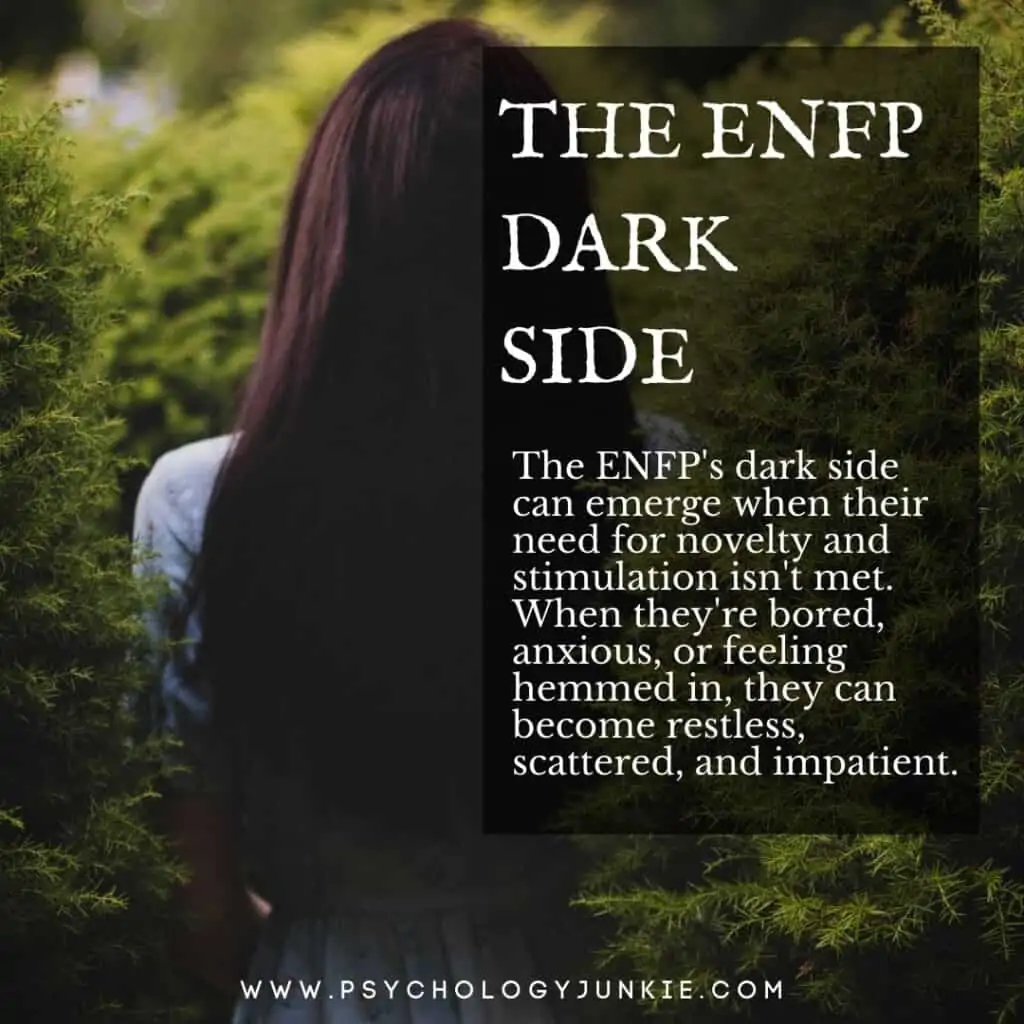

If there’s one factor you’ll be able to rely on with an ENFP, it’s that they’re all the time chasing the following spark of inspiration. They see potential all over the place—in folks, in initiatives, in half-baked concepts scrawled on napkins at 2 AM. They don’t simply wish to comply with the overwhelmed path; they wish to flip it right into a trampoline and see the place it takes them.
Authenticity is non-negotiable for these free-spirited visionaries. They’ll’t stand pretense, whether or not in themselves or others. If society’s guidelines don’t make sense, they’ll problem them. If one thing feels morally off, they’ll stand their floor—even when meaning blazing their very own path as a substitute of following the group.
At Their Greatest:
When ENFPs are on prime of their sport, they’re like a human brainstorming session that by no means runs out of vitality. They join dots nobody else sees, spin concepts into actuality, and encourage others to dream larger. They’re the type of people that make you imagine you’re able to greater than you ever imagined—as a result of they genuinely see that potential in you. They don’t simply discuss change; they are the change.
The Darkish Facet: When Issues Go Off the Rails
However let’s be actual—no kind is sunshine and inspiration on a regular basis. When ENFPs don’t get sufficient novelty or psychological stimulation, they will flip into stressed chaos tornadoes. Boredom is their kryptonite. In the event that they really feel trapped or uninspired, they’ll begin bouncing from one distraction to the following, making impulsive choices simply to really feel one thing. Typically, meaning diving headfirst into dangerous habits. Typically, it simply means ghosting their very own duties. Both method, it invitations issues additional down the highway.
The Immature ENFP:
An ENFP who hasn’t discovered stability is mainly a strolling contradiction—full of massive goals however allergic to follow-through. They get caught up within the pleasure of recent potentialities however battle to complete what they begin. Worse, they will grow to be judgmental of people that don’t share their worldview, as if morality is a “them vs. us” battle slightly than a spectrum of views knowledgeable by advanced life tales.
And criticism? Oh, they hate that. Not in a “thanks for the constructive suggestions” method, however in a “let me clarify to you, at nice size, why I’m really proper” sort of method. In the event that they don’t work by means of this, they could begin shutting out any enter that challenges them—selecting consolation over progress, even when it means stagnating.
When ENFPs Are Confused:
And now let’s have a look at the ENFP below excessive stress. They’re often all about concepts and potentialities, however all of the sudden, they’re obsessing over pointless particulars. They grow to be inflexible, nitpicky, and hypercritical—mainly wanting like an unhealthy model of their reverse (the ISTJ). That is referred to as “grip stress,” and it’s like watching a groundbreaking artist all of the sudden determine their total life is dependent upon alphabetizing their spice rack.
When this occurs, they lose sight of the large image. They tunnel-vision on menial duties, making an attempt to create order of their chaotic minds. It’s not fairly, however it is fixable.
Discovering Steadiness:
ENFPs are happiest after they construct routines that enable for each exploration and consistency. They want time to recharge, whether or not that’s by means of solitude, deep conversations, or spontaneous adventures. Extra importantly, they want a mixture of personalities round them—individuals who problem their considering, floor them after they begin floating too far, and remind them that construction isn’t all the time the enemy.
When ENFPs discover that stability, they’re unstoppable. They convey coloration, creativity, and that means to the world in a method no different kind can. They simply have to recollect: one of the best concepts on this planet imply nothing in case you by no means comply with by means of on them.
The ENTP Darkish Facet
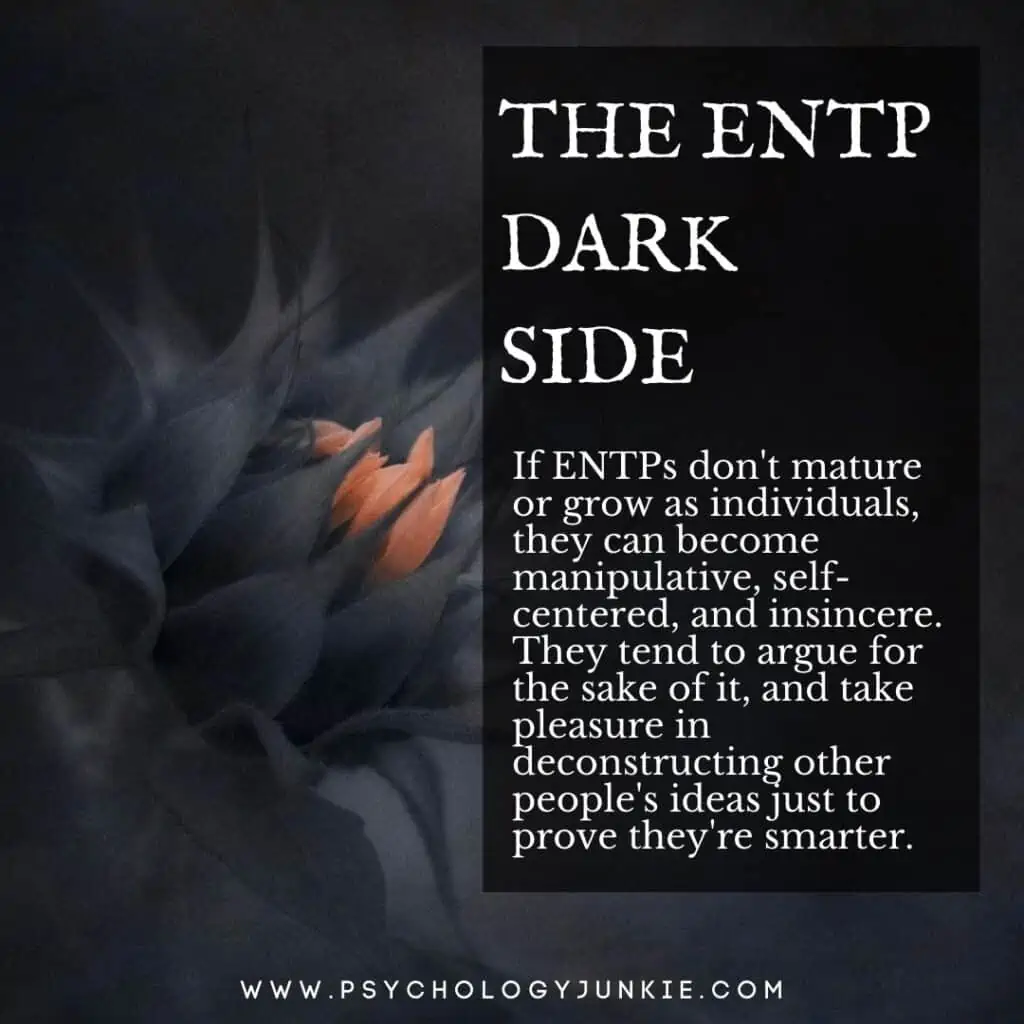

ENTPs are pure problem-solvers and thought turbines. They like to suppose exterior the field and discover uncommon methods to avoid obstacles. After they’re at their greatest, ENTPs are charming, resourceful, and assured. They’ve the ability to see potentialities the place others see roadblocks. They’re additionally wonderful communicators and have a knack for persuading others to see issues from their perspective.
Nevertheless, the ENTP’s darkish facet can emerge when their want for selection and interplay isn’t met. After they’re bored or feeling trapped, they will grow to be anxious, scattered, and impatient. They could make impulsive choices or take useless pointless dangers.
The Immature ENTP
If ENTPs don’t mature or develop as people, they will grow to be manipulative, self-centered, and insincere. They have a tendency to argue for the sake of it, and have the benefit of deconstructing different folks’s concepts simply to show they’re smarter. ENTPs at this degree of growth are extremely insensitive to different folks’s emotions. But beneath their argumentative exterior is often somebody who deeply needs approval and connection they usually could search this out in unhealthy methods.
Relating to duties, unhealthy ENTPs battle to complete what they begin. They depart dozens of half-finished initiatives of their wake and transfer on to one thing new earlier than the earlier job is full. This may be irritating for individuals who need to work with them, because it’s tough to know what can be completed and what gained’t.
When ENTPs are Confused:
When ENTPs are pressured, they often behave in a extra exaggerated trend. They’ll grow to be extra distractible, unfocused, and high-energy. Usually they really feel pulled in a dozen totally different instructions and don’t know the place to focus. If this continues for very lengthy, they may really feel a sudden urge to “flip a swap” and behave like an unhealthy model of their reverse kind (the ISFJ). That is referred to as being within the “grip” of the inferior operate. When this occurs, ENTPs grow to be uncharacteristically timid, indecisive, and risk-averse. They could additionally grow to be withdrawn, hyper-sensitive, and overly emotional. It would really feel to them like they’re offended, however they don’t know why. All of the little particulars of their lives that usually don’t hassle them all of the sudden grow to be overwhelming.
Discovering Steadiness:
One of the best ways for ENTPs to remain balanced is by usually difficult themselves mentally and creatively. They should discover methods to maintain their minds lively, whether or not it’s by means of studying new issues, taking over new initiatives, or spending time with stimulating folks. It’s additionally necessary for them to study to decelerate and deal with one factor at a time. ENTPs ought to provide you with a method for ending the duties which are necessary. In fact, they should discover a technique that works for them and isn’t constructed for somebody with a unique thoughts. For instance, engaged on one undertaking begin to end with out getting distracted is likely to be unrealistic. However setting a objective of finishing two duties a day or taking breaks after working for an hour is likely to be extra doable.
The INFP Darkish Facet


INFPs aren’t right here to simply exist—they’re right here to perceive. Life isn’t a guidelines of accomplishments for them; it’s a journey of self-discovery. “Who am I?” “What do I stand for?” “What’s the that means of all of it?” These are the questions that preserve them up at evening. They’re deep thinkers, drawn to inventive and humanitarian pursuits that enable them to discover these huge existential puzzles.
At their greatest, INFPs are the mild souls of the world—compassionate, imaginative, and unflinchingly true to their values. They don’t simply imagine in kindness and authenticity; they stay it. They see one of the best in folks, typically earlier than these folks see it in themselves. After they’re in stability, they radiate a quiet optimism and heat that makes the world really feel a bit of softer, a bit of kinder.
The Darkish Facet: When the Dreamer Will get Disillusioned
However INFPs can’t all the time inhabit their idealistic, utopian interior world. When life chips away at their idealism, they will fall right into a spiral of disillusionment. As a substitute of being hopeful and open-hearted, they grow to be withdrawn, bitter, and satisfied that the world (or the folks in it) won’t ever stay as much as their expectations.
Their idealism, which as soon as fueled them, can flip into cynicism. They could grow to be inflexible of their beliefs, rejecting any perspective that doesn’t align with their very own. As a substitute of seeing a number of sides to a scenario, they could double down, satisfied that they alone are standing for what’s proper. And when that occurs, they don’t simply withdraw—they decide. Laborious.
The Immature INFP:
At their most undeveloped, INFPs cling to their values like a lifeline—however typically with out actually inspecting them critically. They could maintain onto sure beliefs not as a result of they’ve deeply thought them by means of, however as a result of they really feel proper. And if somebody challenges these beliefs? Be careful. Individuals could begin feeling like they need to stroll on eggshells round them, afraid of setting off an emotional landmine.
One other frequent sample? The obsessive devotion to one individual, trigger, or splendid. When an immature INFP latches onto one thing they imagine in, they could pour each ounce of vitality into it on the expense of every thing else. This could result in exhaustion, burnout, and, ultimately, resentment—both towards themselves for caring an excessive amount of or towards the world for not caring sufficient.
When INFPs Are Confused:
Stress doesn’t hit INFPs unexpectedly—it creeps in. At first, they withdraw, retreating into their very own minds like a hermit on the lookout for refuge in a cave. They second-guess themselves, overanalyzing choices and struggling to see a method ahead. The extra pressured they grow to be, the extra inflexible their considering will get, making it laborious for them to contemplate different views.
And if the stress retains constructing? That’s when issues get bizarre. INFPs, often mild and easygoing, flip a swap and grow to be harsh, important, and uncharacteristically bossy. That is what’s generally known as falling into the “grip” of their inferior operate—Extraverted Pondering (Te). All of the sudden, they’re making checklists, obsessive about effectivity, and feeling like the burden of the world is crashing down on them. Every little thing have to be fastened instantly, and nothing is adequate.
Discovering Steadiness:
For an INFP, stability means nurturing each their introspective facet and their want for connection. They want time alone to recharge, to journal, to get misplaced in nature or an excellent ebook. However in addition they must push themselves out of isolation—speaking issues by means of with trusted buddies, partaking in inventive initiatives, and letting in views that problem their very own.
Most significantly, they should give themselves permission to not have all of the solutions proper now. The that means of life isn’t one thing they’ve to unravel at present, tomorrow, and even this lifetime. However so long as they preserve exploring, creating, and rising, they’re precisely the place they’re meant to be.
The INTP Darkish Facet
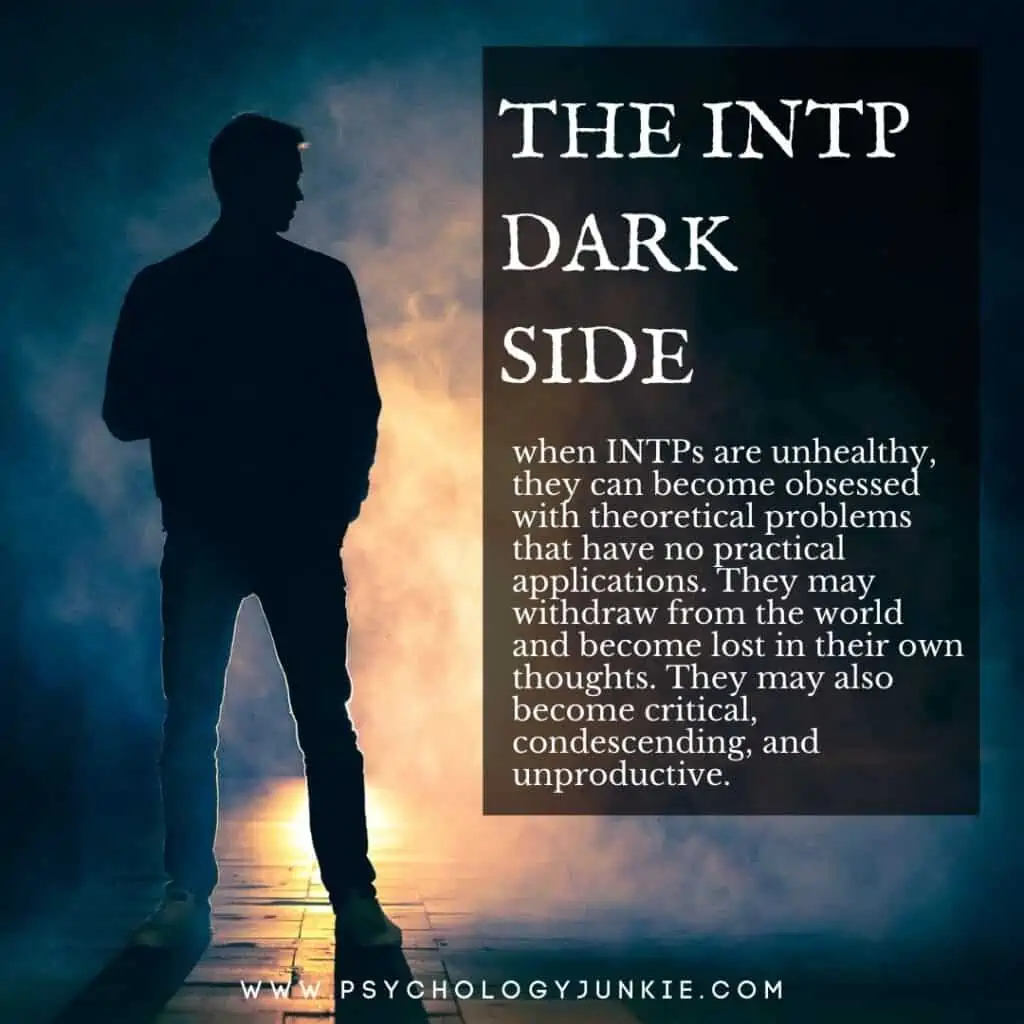

INTPs don’t simply suppose—they obsessively deconstruct, analyze, and reimagine every thing round them. Techniques, theories, summary puzzles? They stay for that stuff. Their minds are like high-powered computer systems continually working simulations, testing potentialities, and determining how every thing really works (not simply how folks suppose it really works).
At their greatest, INTPs are razor-sharp, modern, and brilliantly logical. They’ll see each the forest and the bushes—zooming out for the large image, then zooming in to optimize each final element. They’re problem-solvers within the purest sense, all the time trying to find elegant, inventive options to even essentially the most difficult puzzles.
The Darkish Facet: Theoretical Black Holes & Mental Vanity
However the issue is when INTPs can’t really broaden past their very own intensive ideas. After they slip into an unhealthy mindset, they will get sucked into theoretical rabbit holes with zero real-world software. As a substitute of innovating, they overanalyze. As a substitute of performing, they theorize endlessly. In the event that they go too far, they could retreat into their very own minds completely, turning into out-of-touch, inflexible, and stubbornly satisfied that they’re the one ones who actually get it.
When this occurs, their considering can grow to be a bit of… let’s simply say elitist. They could begin seeing everybody else as intellectually inferior, rolling their eyes at “simplistic” views whereas secretly resenting how simply different folks appear to do issues as a substitute of overthinking them into oblivion. They may clarify their concepts, however why hassle when no person else is working on their degree?
The Immature INTP: The Grasp of Evaluation-Paralysis
An INTP who hasn’t stretched exterior their consolation zone is mainly a thinker trapped in an limitless suggestions loop. They’ve good concepts—none of which ever see the sunshine of day. Why? As a result of the second they think about performing on one thing, their mind floods them with infinite variables, issues, and counterarguments till they’re caught in an existential site visitors jam.
In the meantime, sensible life? Yeah, that’s not taking place. Payments go unpaid, appointments get forgotten, and their bodily wants take a backseat to no matter mental deep dive they’re on this week. They could even battle to speak their ideas clearly—realizing, too late, that their fantastically intricate interior world doesn’t all the time translate properly into phrases. Cue frustration, withdrawal, and an ever-growing suspicion that the world is simply too silly to know them.
When INTPs Are Confused:
At first, stress simply makes INTPs double down on their traditional ways—they retreat, overanalyze, and spend method an excessive amount of time opening new tabs on obscure topics. Their thoughts races in 100 instructions without delay, however none of them result in precise options.
But when the stress builds? That’s when issues can get actually complicated for them (and everybody else). Usually cool and indifferent, they all of the sudden grow to be emotional, hypersensitive, and tormented by self-doubt. That is the dreaded grip stress, the place their inferior operate—Extraverted Feeling (Fe)—takes the wheel. As a substitute of their traditional logical readability, they’re overwhelmed by messy feelings and paranoid that folks secretly hate them.
Worst case? They snap. Usually reserved, they could lash out, get uncharacteristically dramatic, or have an existential meltdown over one thing small. That is horrifyingly embarrassing for them, and as soon as the storm passes, they’ll doubtless withdraw even additional, analyzing the incident from each angle to ensure it by no means occurs once more.
Discovering Steadiness:
INTPs are at their greatest after they create a rhythm that lets them alternate between deep thought and real-world engagement. They want alone time to course of and discover concepts, however in addition they must get out and take a look at issues earlier than they spiral into an mental void.
A number of survival ideas:
- Common solitude (and time for exploration) – They want time to suppose, but when they don’t plan breaks, they’ll disappear into their very own minds indefinitely.
- Debating with sensible folks – The precise discussions (and even arguments) assist sharpen their concepts and preserve them grounded in actuality.
- Low-effort grounding actions – A stroll in nature, a hands-on pastime, and even simply forcing themselves to eat an actual meal will help break the overthinking cycle.
- Breaking initiatives into items – The massive image might be overwhelming, so setting small, actionable objectives can cease them from getting caught in analysis-paralysis.
The underside line? INTPs are good, however even one of the best concepts imply nothing in the event that they by no means make it previous the conceptual stage. If they will discover methods to act on their insights—and never simply theorize about them—they will change the world. Or, on the very least, lastly end that undertaking they began three years in the past.
The ENFJ Darkish Facet
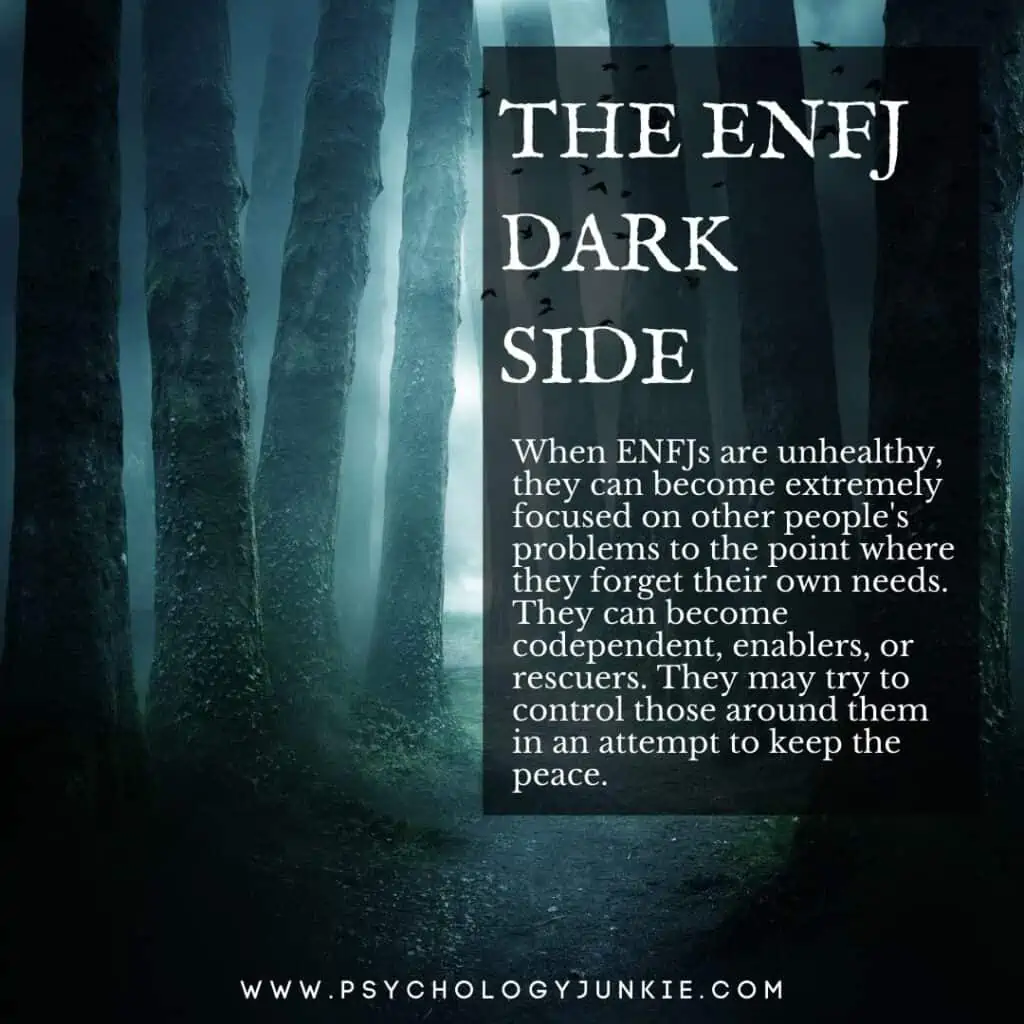

ENFJs don’t simply stroll right into a room—they learn it. Immediately. They decide up on the emotional currents, the unstated tensions, and the quiet wants of the folks round them. It’s like they’ve an emotional sonar, continually scanning for who wants assist, encouragement, or a well-timed pep discuss.
However their empathy isn’t nearly understanding emotions—it’s about doing one thing with that understanding. ENFJs are pushed by a imaginative and prescient of what the world may be, they usually’re keen to place within the work to make it occur. They’re pure leaders, social connectors, and relentless optimists, all the time pushing for progress, concord, and significant change.
At Their Greatest:
A wholesome ENFJ is a drive of nature. Compassionate, charismatic, and deeply intuitive, they encourage folks to be their greatest selves—not simply with phrases, however with motion. They’re visionaries who don’t simply dream of a greater future; they mobilize folks to make it occur. They’re those rallying the troops, organizing the sources, and discovering methods to get everybody on board.
They see each the large image and the folks inside it, making them extremely efficient leaders, mentors, and buddies. In case you’re in an ENFJ’s circle, you’re getting the total VIP remedy: help, encouragement, and an unshakable perception in your potential.
The Darkish Facet: The Savior Complicated & The Management Spiral
However what occurs when an ENFJ’s deal with others begins to eclipse their very own wants? That’s when issues begin to go south.
Unhealthy ENFJs can grow to be so wrapped up in fixing, saving, and supporting everybody else that they fully neglect about themselves. They could overextend, overcommit, and push themselves previous the purpose of exhaustion—as a result of somebody has to carry every thing collectively, proper?
And right here’s the tough half: when folks don’t take their recommendation or make selections that appear self-destructive, ENFJs could begin pushing tougher. Of their minds, they’re simply serving to. However to everybody else? It may really feel smothering, controlling, and even manipulative. Their need to maintain the peace can flip into an exhausting sport of emotional chess, the place they’re subtly making an attempt to maneuver folks into making the “proper” selections.
The Immature ENFJ: The Social Enforcer
An ENFJ who hasn’t matured but might be intensely judgmental—particularly after they suppose somebody is rocking the boat unnecessarily. They could grow to be the self-appointed “social police,” shutting down dissenting opinions, pressuring folks to evolve, and subtly (or not-so-subtly) manipulating conditions of their favor.
They don’t all the time understand they’re doing it. To them, they’re simply being a “good individual” for his or her imaginative and prescient. But when left unchecked, this will make them inflexible, overbearing, and unable to tolerate viewpoints that problem their beliefs.
At this stage, their must be appreciated also can make them keep away from confrontation, even when it’s mandatory. As a substitute of addressing issues head-on, they could suppress their true emotions, sustain a people-pleasing entrance, and let resentment quietly construct till—properly, increase.
When ENFJs Are Confused:
The primary signal of stress? ENFJs attain out. They’ll attempt to discuss it by means of, discover options, or search emotional help from their folks. But when the issue entails competing interpersonal wants (which it often does for an ENFJ), they will get caught. If there’s no clear win-win answer, they spiral—feeling torn, anxious, and emotionally drained.
If stress retains piling up, they begin to withdraw. That is not regular for an ENFJ. They could retreat into themselves, overanalyze each mistake, and begin questioning their very own judgment. As a substitute of their traditional heat and confidence, they grow to be self-critical and insecure.
And in the event that they hit full-on “grip” stress? That’s when issues get actually out of character. Usually empathetic and diplomatic, a pressured ENFJ within the grip of their inferior operate (Introverted Pondering, Ti) turns into chilly, nitpicky, and painfully self-deprecating. They replay each perceived failure, dissect their flaws, and will lash out in frustration—solely to right away really feel responsible about it later.
Discovering Steadiness:
For an ENFJ to remain wholesome, they should study to stability their exterior focus with inside self-care. A number of key survival methods:
- Alone Time is Non-Negotiable – ENFJs want time to replicate, recharge, and reconnect with their very own instinct. Meditation, journaling, or only a quiet stroll will help them keep centered.
- Boundaries, Boundaries, Boundaries – Not each downside is theirs to repair. Studying to step again, say no, and let folks deal with their very own points is essential for avoiding burnout.
- Various Views – Speaking to folks exterior their traditional circles helps them keep open-minded and versatile, stopping the “social police” mentality.
- Studying to Sit with Discomfort – Not each scenario could have an ideal, harmonious decision. Accepting that may assist them keep away from pointless emotional exhaustion.
At their core, ENFJs are highly effective catalysts for change, however they can’t pour from an empty cup. After they discover the proper stability between serving to others and caring for themselves, they grow to be the inspiring, transformative forces they had been meant to be.
The ENTJ Darkish Facet
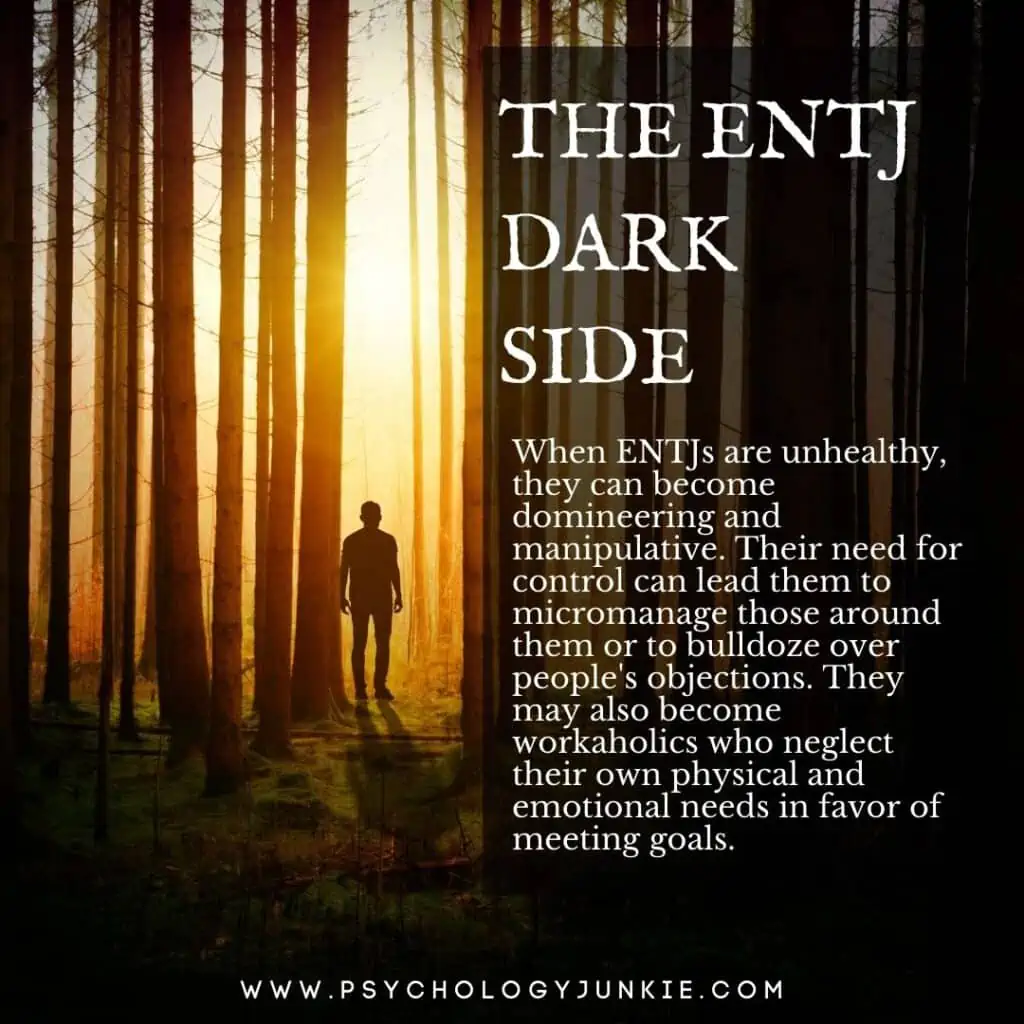

ENTJs don’t simply set objectives—they obliterate them. Their minds function like high-powered engines, continually analyzing, optimizing, and strategizing methods to make issues extra environment friendly. They see the large image, break it down into actionable steps, after which race their method to success.
At their greatest, ENTJs are inspiring leaders who can rally folks round a imaginative and prescient and execute it with precision. They’re natural-born problem-solvers, unafraid to problem inefficiencies, minimize by means of bureaucratic nonsense, and make daring strikes. If there’s a mountain of their method, they gained’t simply climb it—they’ll carve a method by means of it.
The Darkish Facet: When “Effectivity” Turns into “Steamrolling”
However let’s be sincere—subtlety is not the ENTJ’s robust swimsuit. After they go into overdrive, they will grow to be relentless of their pursuit of outcomes, typically on the expense of, properly… humanity.
An unhealthy ENTJ would possibly begin micromanaging, treating folks like chess items slightly than people with emotions. They bulldoze objections, dismiss emotional issues as “inefficiencies,” and assume they all the time know greatest. And whereas they’re on the market conquering objectives, they could fully neglect about their very own fundamental wants—working on caffeine, stress, and sheer drive of will till one thing (or somebody) lastly breaks.
At this stage, persistence? Gone. Flexibility? What’s that? Sensitivity? Ha. They could snap at individuals who “sluggish them down,” dismiss different viewpoints, and count on everybody round them to function on the identical relentless tempo they do. The reality is, most individuals don’t.
The Immature ENTJ: The Steamroller in a Swimsuit
An ENTJ who by no means learns to contemplate different views is, frankly, terrifying. They grow to be inflexible, dogmatic, and obsessive about being proper. In case you disagree with them, put together to be bulldozed into submission—or dismissed completely.
They could belittle individuals who can’t “sustain,” steamrolling over objections with a smug certainty that their method is clearly one of the simplest ways. The issue? This perspective pushes folks away. Laborious. Whereas ENTJs genuinely need significant relationships, their important nature can depart them remoted, questioning why no person sticks round.
And after they do make errors? Don’t count on a straightforward apology. Proudly owning as much as being fallacious isn’t precisely the immature ENTJ’s robust swimsuit—in spite of everything, of their minds, they’ve already calculated the absolute best plan of action. If it didn’t work out, it was in all probability somebody else’s fault, proper?
When ENTJs Are Confused:
ENTJs reply to stress the way in which they reply to most issues: by working tougher. When issues really feel uncontrolled, they double down on productiveness, obsess over fixing issues, and push by means of exhaustion prefer it’s a badge of honor. If sheer willpower can remedy the issue, they’ll make it occur.
However stress doesn’t all the time play by their guidelines. If it builds up an excessive amount of, they hit a breaking level—and that’s when the grip stress kicks in. All of the sudden, the ENTJ who’s all the time in management feels fully out of management.
As a substitute of their traditional assured, take-charge perspective, they grow to be weirdly overwhelmed by emotions (gasp!). They really feel overwhelmed by all of the duties they’ve taken on, not sure of easy methods to transfer ahead. Feelings—these pesky issues they often preserve at arm’s size—begin effervescent to the floor in ways in which freak them out. They could lash out unexpectedly, have an uncharacteristic emotional meltdown, or retreat into isolation. And the worst half? They hate feeling this fashion.
As soon as the storm passes, they typically really feel embarrassed, analyzing each outburst and kicking themselves for “shedding management.” However until they take care of the underlying stress, the cycle simply repeats itself.
Discovering Steadiness:
For an ENTJ to operate at their greatest, they should study to stability ambition with introspection. Right here’s what helps:
- Schedule Downtime Like It’s a Enterprise Assembly – They gained’t “by chance” relaxation, so they should plan it. Time for reflection, rest, and stepping away from work is non-negotiable.
- Ask for Assist (Sure, Actually) – They’re used to main, however typically they should let folks help them. Delegating isn’t a weak spot—it’s sensible.
- Follow Persistence – Not everybody operates at their velocity. Slowing down, listening, and contemplating totally different viewpoints will make them stronger, not weaker.
- Get Snug with Feelings – Their very own and different folks’s. They don’t need to grow to be a therapist, however acknowledging emotions as a substitute of dismissing them as “illogical” will enhance each their relationships and decision-making.
At their peak, ENTJs are unstoppable—visionary leaders who drive progress and make issues occur. However even the sharpest minds want relaxation, stability, and human connection to actually thrive.
The INFJ Darkish Facet


INFJs don’t simply perceive folks—they see by means of them. Their reward isn’t simply empathy; it’s perception. They grasp folks’s feelings, motivations, and interior struggles earlier than these folks even put phrases to them. It’s nearly eerie. However they don’t simply see—they information, gently nudging others towards private or religious progress like some sort of intuitive life coach.
At their greatest, INFJs are inventive, compassionate, and deeply purpose-driven. They aren’t right here to simply exist—they’re right here to make a distinction. Whether or not by means of artwork, activism, or one-on-one connections, they try to go away the world higher than they discovered it.
The Darkish Facet: The Hermit Spiral & the Idealism Entice
However right here’s the factor—INFJs can get misplaced in their very own minds. After they withdraw an excessive amount of, they begin residing of their concepts as a substitute of actuality. In the event that they’re not actively utilizing their insights to assist others, they could spiral into limitless daydreams, replaying deep philosophical debates with themselves as a substitute of partaking with the actual world.
An unhealthy INFJ may also grow to be too connected to their beliefs, refusing to just accept actuality’s imperfections. The world isn’t residing as much as their imaginative and prescient? Then neglect it. They take a look at. Tasks—like paying payments, staying on prime of labor, or, you already know, fundamental hygiene—begin slipping by means of the cracks. They’ll get so misplaced within the huge image that they neglect concerning the little particulars—like consuming, sleeping, or returning that textual content from three weeks in the past.
The Immature INFJ: The Dreamer Who Gained’t Have interaction
A stagnant INFJ is a tragic sight—a lot potential, however none of it used. They keep trapped in their very own minds, weaving difficult fantasies concerning the future whereas neglecting the current. They’ve a imaginative and prescient for the way issues ought to be however battle to settle for how issues really are.
At this stage, they will additionally grow to be judgmental—not outwardly, however internally. They could really feel just like the world simply doesn’t get it, that persons are too shallow or short-sighted to know the deeper truths they see. This could make them withdraw additional, satisfied that significant connection is not possible.
When INFJs Are Confused:
At first, stress makes INFJs retreat into their traditional methods—they withdraw, analyze, and attempt to intuit their method out of the issue. They’ll spend hours looking for that means, replaying conditions of their heads, and hoping for a grand realization that makes every thing click on.
But when stress builds an excessive amount of? That’s when issues get actually complicated. As a substitute of their traditional cautious, methodical strategy, they flip. That is referred to as a “grip” response, and it means their mind short-circuits into its reverse operate—Extraverted Sensing (Se).
All of the sudden, the INFJ who’s usually cautious and introspective is doing issues that make no sense. Impulsive choices. Reckless habits. Staying up all evening binge-watching reveals or making horrible Amazon purchases at 3 AM. They could lash out in frustration, act completely out of character, after which—as soon as the stress fades—really feel an amazing sense of disgrace.
“What was I considering?” they’ll marvel, cringing at their very own habits. And since INFJs hate feeling uncontrolled, this entire expertise makes them withdraw much more, vowing by no means to let themselves “lose it” like that once more.
Discovering Steadiness:
For INFJs to actually blossom, they should stability their introspective, idealistic facet with real-world engagement. Some key methods:
- Get Exterior the Thoughts Palace – Spending time in nature, volunteering, or partaking with totally different views retains them grounded.
- Alone Time is Important (However Not Whole Isolation Eternally) – They want quiet, reflective time to course of their ideas—however absolute reclusiveness results in stagnation.
- Trusting Their Instinct – They typically know what’s proper for them however second-guess themselves. Meditation, journaling, or inventive retailers assist them keep related to their interior voice.
- Taking Care of the Mundane – INFJs could detest boring duties, however construction and routine assist preserve them from drifting into the void.
INFJs need to alter the world, however they’ve to remain engaged with it to take action. After they discover that stability—between imaginative and prescient and actuality, introspection and motion—they grow to be the smart, compassionate guides they had been meant to be.
The INTJ Darkish Facet


INTJs don’t simply see the world—they map it out. Their brains are continually figuring out patterns, predicting outcomes, and strategizing essentially the most environment friendly method ahead. Life is a puzzle, they usually’re decided to unravel it with the fewest strikes attainable.
At their greatest, INTJs are visionary problem-solvers. They see what others miss, connecting summary ideas to real-world options. They don’t simply adapt to alter—they orchestrate it.
The Darkish Facet: The Indifferent Strategist
However what occurs when an INTJ stops partaking with actuality and retreats too far into their very own thoughts? That’s when issues can get messy.
An unhealthy INTJ can grow to be chilly, dismissive, and inflexible—so locked into their imaginative and prescient of how issues must be that they ignore any information (or emotions) that contradict it. As a substitute of their traditional curiosity, they default to conceitedness, assuming they already know the reply earlier than they’ve absolutely examined the issue.
And socially? Neglect it. Their persistence for small discuss, emotional issues, or something that doesn’t serve a transparent function is gone. At greatest, they withdraw. At worst, they grow to be ruthlessly important, reducing down something (or anybody) they see as inefficient, illogical, or simply fallacious.
The Immature INTJ: The Overthinking Recluse
An INTJ who hasn’t developed emotional intelligence is mainly a strolling paradox: good however impractical. They’ve groundbreaking concepts however battle to execute them. They could obsess over theories and long-term methods however fully overlook on a regular basis particulars—like consuming, responding to messages, or remembering to sleep.
Socially, they will come throughout as chilly, blunt, and even condescending. It’s not that they imply to be insensitive; they only don’t see why they need to sugarcoat issues when the reality is extra environment friendly. However this lack of social finesse can depart them remoted, questioning why folks don’t respect their brilliantly logical views.
The irritating half? They typically do need deep, significant relationships—however they battle to prioritize them. Interacting with others can really feel like an unproductive distraction, in order that they push folks away with out absolutely realizing it.
When INTJs Are Confused:
When an INTJ first encounters stress, they do what they do greatest: analyze. They withdraw from the world, comb by means of each attainable sample and perspective, and attempt to intuit their method out of it.
At this stage, interruptions are infuriating. They won’t present it outwardly, but when somebody derails their practice of thought, their interior monologue is mainly: Why are you talking? Do you not see that I’m fixing the mysteries of the universe?
But when stress builds an excessive amount of? That’s when issues get actually difficult.
As a substitute of their traditional methodical strategy, they flip. That is referred to as a “grip” response, and it means their mind will get hijacked by their inferior operate—Extraverted Sensing (Se). All of the sudden, the INTJ who often calculates each transfer is making impulsive, dangerous choices.
They could begin spending cash recklessly, diving into excessive bodily exercise, or making selections that don’t align with their long-term imaginative and prescient. Some INTJs channel this into productive retailers (like intense exercises or inventive initiatives), however internally, they nonetheless really feel scattered and uncontrolled.
Afterward? The remorse hits. Laborious. INTJs hate feeling like they’ve misplaced management, in order that they retreat even additional, analyzing each mistake in excruciating element to ensure it by no means occurs once more.
Discovering Steadiness:
For INTJs to operate at their greatest, they should stability their interior world with exterior engagement. Some key methods:
- Non-Negotiable Alone Time – INTJs want uninterrupted time to suppose, course of, and strategize. With out it, their stress ranges skyrocket.
- Taking Motion (Not Simply Planning) – It’s simple for them to get caught in evaluation mode. Setting concrete, measurable objectives helps make sure that they don’t keep trapped in theoretical loops.
- Constructing (and Sustaining) Relationships – Whereas they could view socializing as optionally available, robust relationships present useful views and preserve them grounded. Discovering a number of trusted folks they will really confide in is vital.
- Training Flexibility – The perfect plans nonetheless want room for adjustment. Staying open to new info and totally different viewpoints prevents them from turning into inflexible or dismissive.
At their peak, INTJs are profoundly visionary—insightful, strategic, and able to turning their concepts into real-world impression. However even the sharpest minds want stability. After they study to mix mind with motion, logic with empathy, and solitude with connection, they grow to be the highly effective masterminds they had been meant to be.
The ESFP Darkish Facet
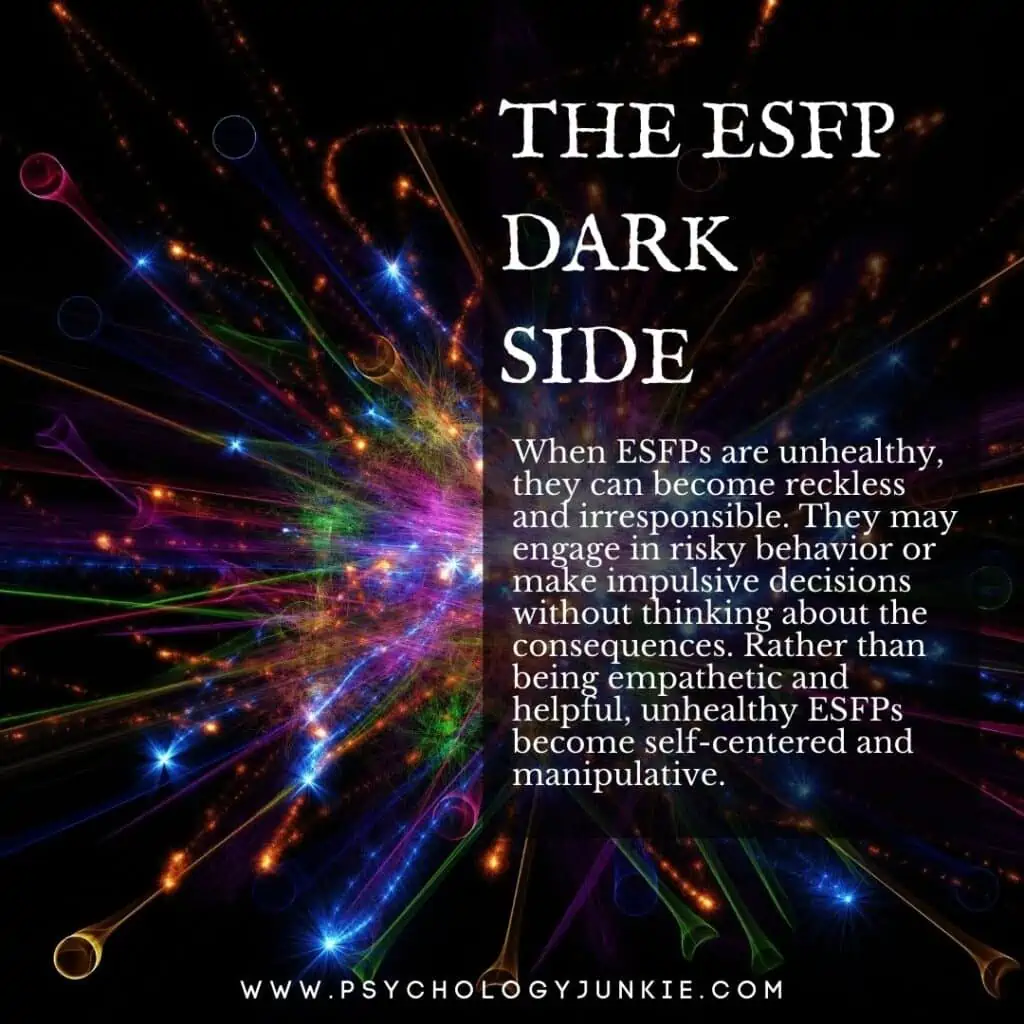

ESFPs are all about waking folks as much as expertise. They’re those turning on a regular basis moments into mini-adventures, dragging their buddies into spontaneous highway journeys, and reminding everybody that life is supposed to be lived, not simply deliberate. Their pure charisma and eager observational expertise make them masters of studying the room, they usually’re typically the primary to raise the temper when issues begin feeling a bit of too critical.
At their greatest, ESFPs are adaptable, fun-loving, and deeply current. They’re not nearly low cost thrills—they’re about actual connection, serving to folks see the enjoyment in life even when issues get robust. In addition they have an underrated sensible facet. As a result of they’re continually tuned in to their environment, they’re typically the primary to note when somebody wants assist and can leap in with out hesitation.
The Darkish Facet: When “Enjoyable” Turns into “Reckless”
However for all their pleasure and spontaneity, ESFPs can battle when life slows down. An unhealthy ESFP would possibly begin chasing instantaneous gratification laborious, making impulsive selections with out enthusiastic about the long-term penalties. They could take pointless dangers, ignore their duties, or use their attraction in additional manipulative methods to get what they need.
After they’re on this state, their traditional empathy takes a backseat. As a substitute of being the enjoyable, supportive pal, they grow to be self-absorbed thrill-seekers, prioritizing their subsequent dopamine hit over the individuals who care about them. If left unchecked, this will result in a cycle of dangerous choices, remorse, and even self-sabotage.
The Immature ESFP: The Escape Artist
An ESFP who refuses to develop is a whirlwind of distraction. They leap from one thrilling exercise to the following, by no means pausing lengthy sufficient to replicate on what actually issues. They could keep away from tough feelings, filling each waking second with noise, folks, and leisure to keep away from sitting alone with their ideas.
At this stage, they battle with dedication—whether or not to relationships, duties, and even private objectives. As a substitute of dealing with challenges head-on, they bolt on the first signal of discomfort. The consequence? A life full of thrilling moments however missing deeper success.
When ESFPs Are Confused:
When stress first creeps in, ESFPs do what they do greatest: distract themselves. They could throw themselves into actions, binge-watch their favourite reveals, or hit the health club in an try and shake off the negativity. They’ll attempt to reframe the scenario, discover the brilliant facet, and preserve shifting ahead.
But when stress builds up? That’s when issues get darkish.
A deeply pressured ESFP flips into their shadow self, all of the sudden turning into pessimistic, withdrawn, and hyper-focused on the longer term. Usually all concerning the current second, they begin obsessing over worst-case situations, satisfied that every thing is doomed. As a substitute of seeing potentialities, they see inevitabilities, and none of them look good.
At this stage, they could isolate themselves, overthink each determination, and really feel totally trapped—a sense ESFPs hate greater than something. In the event that they don’t discover a method to reset, they will spiral into cynicism, feeling like life’s greatest days are behind them.
Discovering Steadiness:
For ESFPs to remain grounded, they have to strike a stability between spontaneity and stability. Some key methods:
- Enjoyable Isn’t the Enemy of Construction – ESFPs are at theri greatest after they have some flexibility, however fully avoiding routine can depart them scattered. Discovering a center floor (like setting small objectives with built-in rewards) retains them shifting ahead with out feeling trapped.
- Alone Time Is a Reset Button – It sounds counterintuitive for an extrovert, however ESFPs want moments of solitude to recharge and course of their experiences. Whether or not it’s going for a run, sitting with music, or spending time in nature, a bit of quiet helps them reconnect with their deeper values.
- Sitting with Discomfort – Avoiding robust feelings solely makes them tougher to take care of later. ESFPs profit from taking a pause when issues get robust as a substitute of instantly distracting themselves.
- Huge Objectives, Small Steps – Pondering long-term can really feel overwhelming, however breaking a objective into bite-sized steps makes it simpler to stay with. Plus, they will make a sport out of it—as a result of let’s be actual, ESFPs are far more motivated when there’s some factor of enjoyable concerned.
What ESFPs actually are is deeply and dynamically current. They convey vitality, pleasure, and spontaneity into the world, serving to folks keep in mind that life isn’t nearly surviving—it’s about recognizing pleasure in each second. However for their very own progress, they need to study that enjoyable and accountability aren’t opposites. After they grasp that stability, they grow to be not simply the lifetime of the celebration, however the sort of one who can actually change lives.
The ESTP Darkish Facet
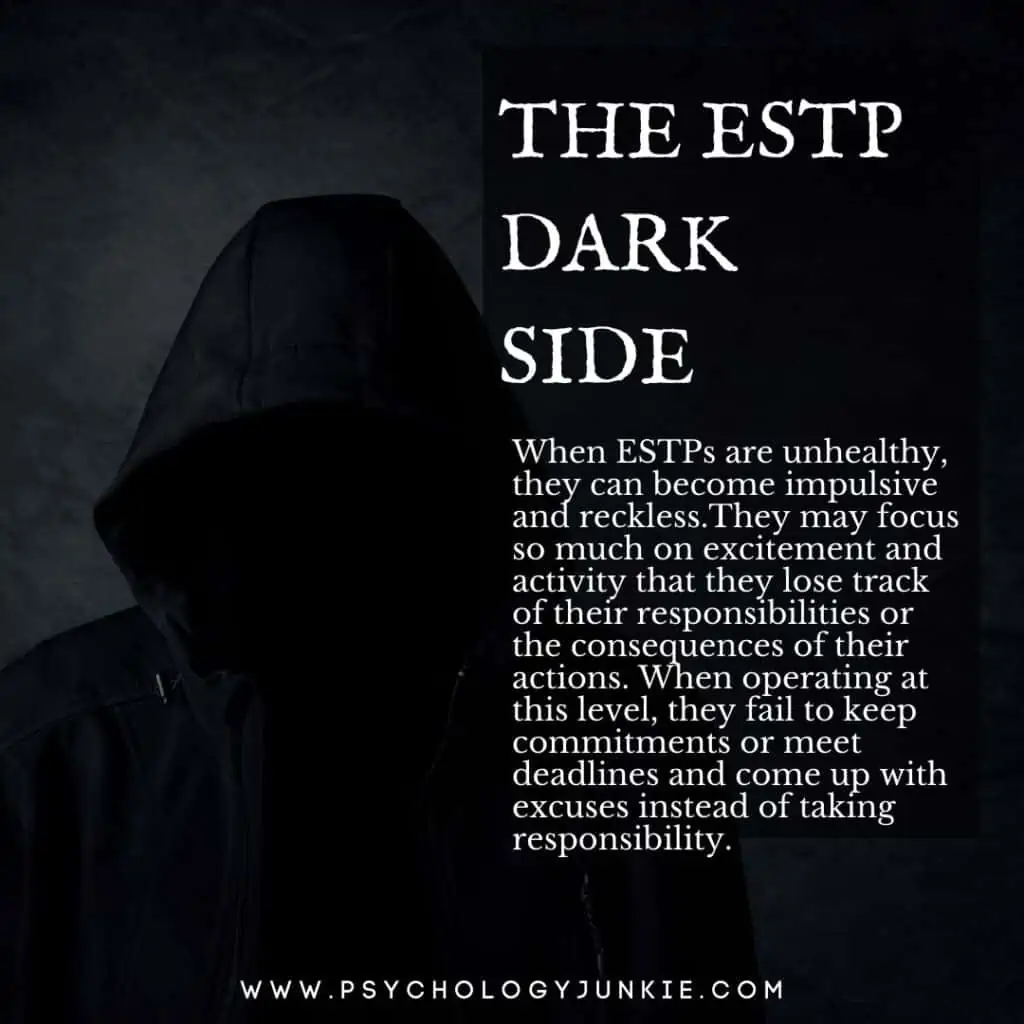

ESTPs are the last word doers. Whereas different persons are nonetheless considering about what to do subsequent, the ESTP is already three steps forward, making strikes and adapting on the fly. They’re quick-witted, daring, and thrive in environments the place motion is required, not simply mentioned.
Disaster? Problem? Excessive-stakes scenario? They stay for these things. Their sharp instincts, rational decision-making, and sheer confidence make them the individual you need in your staff when issues hit the fan.
At Their Greatest:
A well-developed ESTP is unstoppable. They’re perceptive, resourceful, and adaptable, with an simple attraction that pulls folks in. They’ve a knack for studying the room, understanding what folks actually need, and persuading others—with out resorting to manipulation.
They stability their adventurous streak with a logical, results-driven mindset. Not like some thrill-seekers, they know when to take sensible dangers and when to play it secure. They’re action-oriented, however in addition they know easy methods to win—whether or not that’s in enterprise, relationships, or a well-planned prank.
The Darkish Facet: When Thrill-Looking for Turns to Self-Sabotage
However when an ESTP leans too laborious into their fun-first, think-later instincts? That’s when issues begin getting dicey.
An unhealthy ESTP can grow to be impulsive, reckless, and damaging—not simply in their very own life, however within the lives of these round them. They chase pleasure on the expense of accountability, making selections purely for the push with out enthusiastic about long-term penalties.
Deadlines? Ignored. Commitments? Forgotten. Excuses? Lots. They could smooth-talk their method out of accountability, convincing themselves (and typically others) that their attraction will repair every thing. However ultimately, folks catch on, and their credibility takes successful.
And when their traditional attraction doesn’t get them what they need? They’ll shift from charismatic to demanding, steamrolling over folks’s wants of their quest to maintain the thrill going.
The Immature ESTP: The Pleasure-Looking for Escapist
An ESTP who refuses to develop is mainly hedonism in human type. Each determination revolves round what feels good proper now—with zero regard for the way it will have an effect on their future.
They downplay their logical facet, focusing completely on their sensing facet: motion, thrills, and fast gratification. They could chase pleasure at the price of monetary stability, emotional well-being, and even friendships. Of their pursuit of pleasure, they will grow to be callous—dismissive of deeper feelings and blind to the impression their actions have on others.
At this stage, they’re working on life slightly than residing it. They’re all the time shifting, all the time chasing, however by no means pausing lengthy sufficient to ask themselves, Am I really pleased with the life I’m constructing?
When ESTPs Are Confused:
Stress hits ESTPs in two very alternative ways.
At first, they double down on what they do greatest—motion. They throw themselves into distractions, sort out issues head-on (typically recklessly), or hunt for a fast repair. If there’s an apparent answer, nice. If not? They’ll discover a method to preserve shifting and hope the issue types itself out.
But when stress turns into persistent? That’s when issues take a darkish flip.
A deeply pressured ESTP can spiral into full-blown paranoia, seeing threats and betrayals all over the place. Their often sharp instincts grow to be distorted, making them hyper-suspicious and vulnerable to misreading conditions. They could lash out, withdraw, or make knee-jerk choices that solely worsen the scenario.
At their lowest, they lose belief in others and in themselves—turning into jumpy, defensive, and satisfied that the world is out to get them.
Discovering Steadiness:
For ESTPs to thrive, they want a mix of freedom and self-discipline. A number of key methods:
- Unstructured Time is Important – They want journey, spontaneity, and room to discover. Overly inflexible schedules will make them really feel caged.
- However Construction is Needed – Whereas they resist routine, some degree of construction helps preserve their lives from spiraling into chaos. Setting small, versatile objectives with built-in rewards makes accountability really feel much less like a jail sentence.
- Slowing Down is a Superpower – It feels unnatural, however taking a pause earlier than making huge choices can save them from pointless disasters. Typically, one of the best transfer isn’t the quickest one.
- Deep Conversations Matter – They crave motion, however actual progress comes after they hear, not simply react. Speaking with individuals who problem them—whether or not in a debate, a method session, or a heart-to-heart—retains them sharp and self-aware.
Deep down, ESTPs are powerhouses—action-oriented, fearless, and sharp as hell. However their actual power comes after they study to stability velocity with technique, journey with introspection, and independence with belief. After they grasp that? There’s no problem they can’t conquer.
The ISFP Darkish Facet
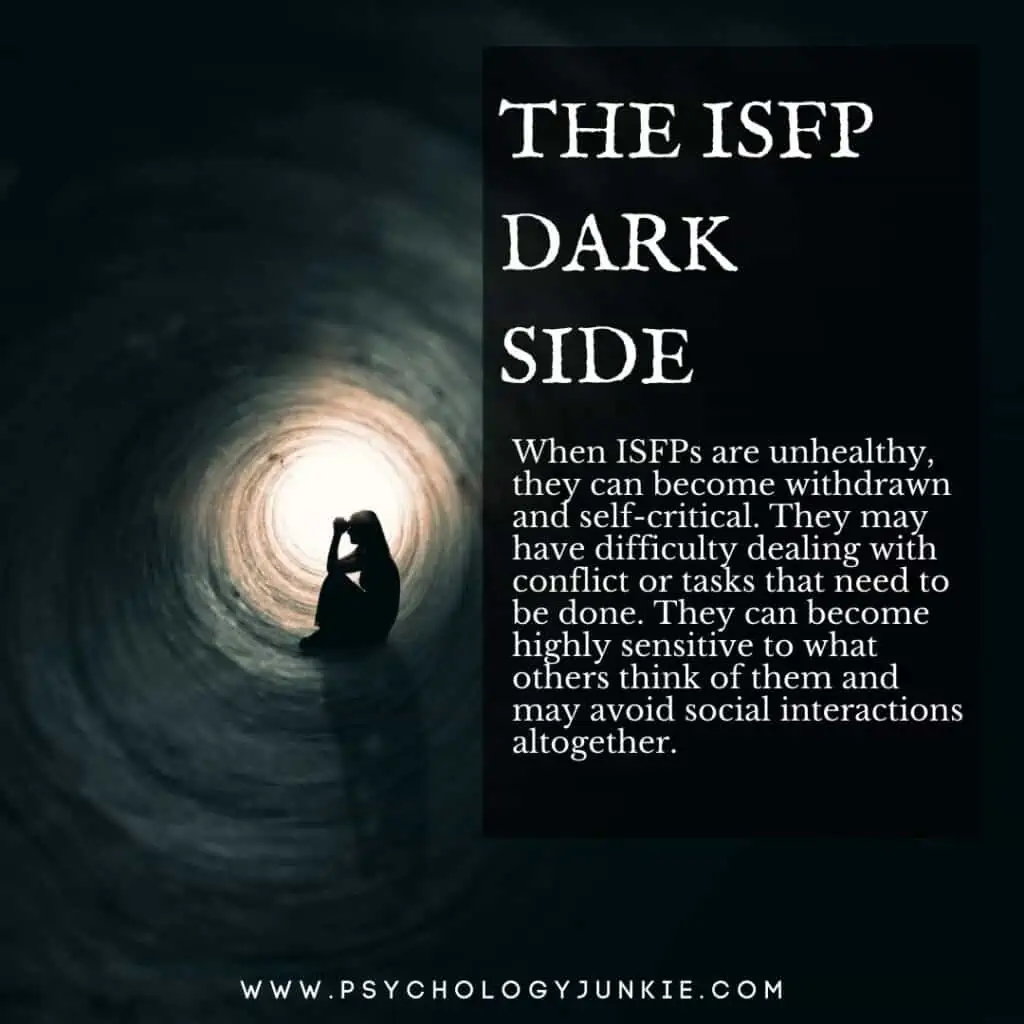

ISFPs are a strolling contradiction in one of the simplest ways attainable—mild however impartial, delicate but pragmatic, deeply feeling but firmly grounded in the actual world. They aren’t right here to make lots of noise or inform folks easy methods to stay; they merely are. They categorical themselves by means of motion—by means of artwork, motion, music, craftsmanship, and the quiet, on a regular basis particulars that most individuals overlook.
At their greatest, ISFPs are deeply in tune with each their feelings and the world round them. They decide up on magnificence within the smallest issues—a flicker of daylight by means of the bushes, the proper mixture of flavors in a meal, the way in which a track can seize a sense no phrases ever may. They’ve a wealthy, personal sense of integrity and hate something that feels pretend or insincere.
They don’t simply discuss about values—they stay them, expressing kindness and empathy by means of motion slightly than grand declarations. If an ISFP helps you, it’s not as a result of they really feel obligated—it’s as a result of they need to.
The Darkish Facet: When Sensitivity Turns into Isolation
For all their quiet power, ISFPs can battle when the world feels too overwhelming. An unhealthy ISFP can grow to be so consumed by their very own feelings that they withdraw completely, shutting folks out to keep away from battle or judgment.
Criticism hurts them on a deep degree, and after they’re not in a wholesome place, they take it personally—typically to the purpose the place they begin avoiding folks altogether. If issues get dangerous sufficient, they could disengage from duties, deciding that nobody can inform them what to do. In excessive instances, this turns into passive revolt—quietly refusing to comply with guidelines, obligations, or social expectations, even when it comes at their very own expense.
The Immature ISFP: The Fragile Artist
An undeveloped ISFP is somebody who errors emotions for information. As a substitute of balancing emotion with cause, they assume that no matter they really feel within the second is absolutely the fact. This could make them self-absorbed, unable to see past their very own experiences.
They could additionally keep away from battle to an unhealthy diploma, bottling up resentment as a substitute of addressing points immediately. However the factor about bottled-up feelings? They explode ultimately. And after they do, an immature ISFP’s emotional outburst can really feel fully sudden to these round them—like a quiet breeze all of the sudden turning right into a hurricane.
Some immature ISFPs might also battle with self-discipline, prioritizing what feels good within the second over long-term stability. Construction? Routines? Planning forward? Ugh. It’s not that they can’t do these items—it’s simply that, left unchecked, they typically gained’t.
When ISFPs Are Confused:
When stress creeps in, ISFPs do what they do greatest: they retreat. They want house to kind by means of their emotions, to course of what’s taking place internally earlier than they will get out and expertise the surface world once more.
But when stress builds? That’s when issues get bizarre.
Beneath excessive stress, ISFPs can flip into their reverse operate—Extraverted Pondering (Te)—and all of the sudden grow to be hyper-controlling. The usually chill, go-with-the-flow ISFP turns into obsessive about getting their life on monitor. They get caught obsessively organizing, making calls for, and turning into uncharacteristically blunt. They could all of the sudden fixate on productiveness, snapping at folks for not assembly their requirements or taking out their frustration on their surroundings (cue deep-cleaning frenzies and obsessive reorganizing).
As soon as the stress passes, they often really feel embarrassed and confused—like, who was that individual?
Discovering Steadiness:
For an ISFP to thrive, they have to strike a stability between interior reflection and exterior engagement. Some key survival methods:
- Inventive Retailers are Non-Negotiable – Whether or not it’s portray, journaling, cooking, or just taking lengthy walks alone, ISFPs want house to precise themselves freely.
- Coping with Battle Head-On – Avoiding issues doesn’t make them go away. Studying to speak wants and limits clearly (as a substitute of resorting to passive-aggression) makes life a lot simpler.
- A Little Construction Goes a Lengthy Method – Nobody’s saying they should schedule each hour of their day, however some degree of planning helps forestall their duties from piling up.
- Perspective Issues – Speaking to trusted buddies or mentors will help ISFPs get out of their very own heads and see issues from a unique angle.
At their core, ISFPs are residing artwork—deep, soulful, and attuned to the fantastic thing about the world. After they study to stability their sensitivity with resilience, their independence with connection, and their feelings with cause, they grow to be world-changing.
The ISTP Darkish Facet


ISTPs don’t simply suppose—they tinker. They’re hands-on, analytical, and deeply interested by how every thing on this planet works. Whether or not it’s fixing a damaged engine, hacking a system, or determining easy methods to open a cussed jar lid, ISTPs love an excellent problem.
At their greatest, ISTPs are impartial, resourceful, and funky below strain. They don’t simply discuss about options—they construct them. They imagine actions communicate louder than phrases and can present up if you want them most, typically with a sensible repair earlier than you even understand you will have an issue. They don’t count on recognition for his or her assist (in truth, an excessive amount of consideration makes them uncomfortable), however they’re the individual you need in a disaster.
The Darkish Facet: When Disconnection Turns to Cynicism
However when an ISTP will get too withdrawn? That’s when issues begin to crack.
An unhealthy ISTP retreats up to now into their very own world that they lose contact with every thing exterior of it. They cease partaking, cease caring, and—if left unchecked—can grow to be bitterly cynical. As a substitute of their traditional cool-headed logic, they hyper-focus on every thing that’s fallacious with the world and the folks in it.
At this stage, their blunt honesty turns into useless criticism. They cease providing options and begin mentioning issues—with out bothering to repair them. And in the event that they’re actually spiraling, they could simply ghost their duties completely, refusing to be tied down by obligations they by no means wished within the first place.
The Immature ISTP: The Blunt Instrument
An undeveloped ISTP is somebody who values logic over every thing else—to the purpose the place they neglect folks even have feelings.
They name it “being sincere.” Everybody else calls it brutal.
At this stage, they’re dismissive of emotions, duties, and something that appears like a constraint. They’ll say precisely what they suppose, precisely how they suppose it—with out a second thought for the way it lands.
In the meantime, their sensible, in-the-moment nature could cause them to disregard long-term penalties. Payments? Deadlines? Commitments? Eh, they’ll take care of it later. Till “later” turns into by no means, and all of the sudden they’re scrambling to repair one thing they completely may have prevented.
When ISTPs Are Confused:
More often than not, ISTPs deal with stress the way in which they deal with every thing—calmly and logically. They analyze the issue, provide you with a plan, and execute it with cautious precision.
However when stress piles up? That’s when issues go sideways.
At first, they withdraw—laborious. They want house to suppose, course of, and not take care of folks. Interrupt them at this stage, and also you would possibly get the coldest, most unbothered stare of your life.
But when the stress retains coming? That’s when the grip response kicks in.
A pressured ISTP flips into their reverse operate—Extraverted Feeling (Fe)—and all of the sudden turns into method extra emotional than traditional. They could begin worrying about issues they usually ignore, grow to be paranoid about rejection, or—worst case—explode in an outburst they later remorse. That is deeply embarrassing for them, and afterward, they’ll faux it by no means occurred whereas internally replaying each second of their meltdown.
Discovering Steadiness:
For an ISTP to remain at their greatest, they want a mixture of independence and engagement. Some key methods:
- Alone Time is Sacred – ISTPs want house to recharge. No interruptions, no pointless small discuss—simply time to suppose, experiment, and work on no matter undertaking has caught their curiosity.
- However Connection is Nonetheless Vital – Even essentially the most self-sufficient ISTP advantages from a number of strong relationships. Making time for trusted buddies, household, or perhaps a low-pressure social pastime helps preserve them from by chance turning into a hermit.
- Small Objectives Preserve Them on Monitor – Lengthy-term planning isn’t their favourite, however breaking issues down into fast, actionable steps makes accountability extra manageable.
- Dealing with Battle with Logic and Tact – Directness is nice—brutality isn’t. Studying to phrase issues in a method that’s clear with out being unnecessarily harsh goes a good distance in maintaining relationships robust.
Basically, ISTPs are the fixers—the individuals who see what’s damaged and discover a method to make it work. After they stability their want for independence with a bit of real-world engagement, they grow to be unstoppable forces of ingenuity, resilience, and no-nonsense problem-solving.
The ESFJ Darkish Facet
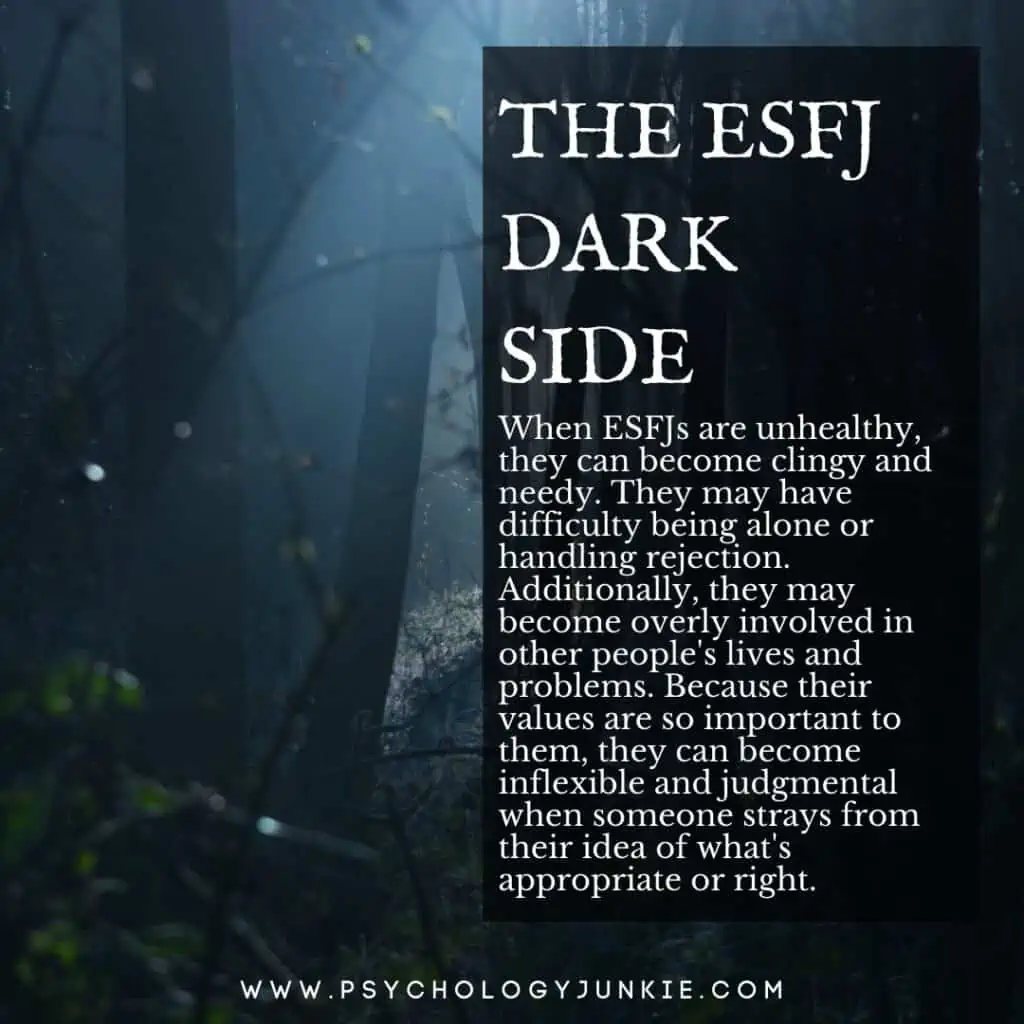

ESFJs are the pleasant community-builders that preserve every thing working easily. They’re those remembering birthdays, ensuring everybody feels included, and stepping in with a heat meal when somebody’s having a tough day. They don’t simply care about folks—they take care of them.
At their greatest, ESFJs are beneficiant, reliable, and deeply attuned to the wants of these round them. They convey stability and concord wherever they go, ensuring their family members really feel supported and safe. Whether or not they’re organizing an occasion, providing a shoulder to cry on, or maintaining a group related, ESFJs are happiest after they’re making life higher for others.
The Darkish Facet: When Serving to Turns into Controlling
However what occurs when an ESFJ’s care turns into over-care? That’s when issues get difficult.
An unhealthy ESFJ can grow to be clingy, overbearing, and emotionally dependent. They could battle with being alone, needing fixed validation to really feel safe. In the event that they’re not cautious, their need to assist can flip into meddling—inserting themselves into different folks’s issues whether or not they’re wished or not.
And since ESFJs have robust private values, they will grow to be inflexible of their beliefs, judging those that don’t align with their moral sense. What begins as well-intentioned steering can flip into self-righteousness, leaving others feeling pressured or suffocated.
The Immature ESFJ: The Individuals-Pleasing Enforcer
An undeveloped ESFJ has two modes: over-accommodating doormat or ethical authority of the universe—typically switching between the 2 in document time.
They could grow to be obsessed with maintaining relationships intact, saying “sure” to every thing and exhausting themselves within the course of. They’ll tackle everybody’s emotional burdens, forgetting that their very own wants additionally matter.
On the flip facet, they could grow to be demanding and self-righteous, anticipating others to comply with their sense of custom, responsibility, or morality. If somebody doesn’t conform? Cue frustration, judgment, and perhaps a passive-aggressive guilt journey.
When ESFJs Are Confused:
At first, stress makes ESFJs double down on their traditional coping mechanisms. They’ll vent to buddies, search for consolation of their routines, and search out reassurance that they’re heading in the right direction. They want connection, and shutting them out solely makes issues worse.
But when stress piles up? That’s when the grip response kicks in.
An overwhelmed ESFJ flips into their reverse operate—Introverted Pondering (Ti)—and all of the sudden turns into hyper-analytical and withdrawn. As a substitute of their traditional heat, people-focused strategy, they begin overanalyzing every thing.
They replay previous errors, decide aside their very own logic, and spiral right into a state of analysis-paralysis. Worst case? They grow to be pessimistic, self-critical, and reclusive, satisfied that they’ve messed every thing up and nobody really values them. It’s a very unsettling shift.
Discovering Steadiness:
For ESFJs to be balanced, they should study to worth their want for social reference to self-care and independence. Some key survival methods:
- Alone Time is NOT Egocentric – ESFJs want moments to recharge with out feeling responsible. Journaling, meditating, or spending time in nature helps them reconnect with themselves.
- Not Each Drawback is Theirs to Remedy – Studying to step again and let others deal with their very own challenges prevents emotional burnout.
- Wholesome Boundaries = More healthy Relationships – Saying “no” (with out guilt) helps forestall resentment and exhaustion. Not everybody deserves a front-row seat to their emotional vitality.
- Logic and Emotion Work Greatest Collectively – Embracing their analytical facet earlier than stress forces them into it might probably assist them make extra balanced choices.
When it comes right down to it, ESFJs are the center of their communities—nurturing, loyal, and deeply invested in making life higher for the folks they love. After they study to stability look after others with look after themselves, they grow to be not simply supportive, however unstoppable.
The ESTJ Darkish Facet
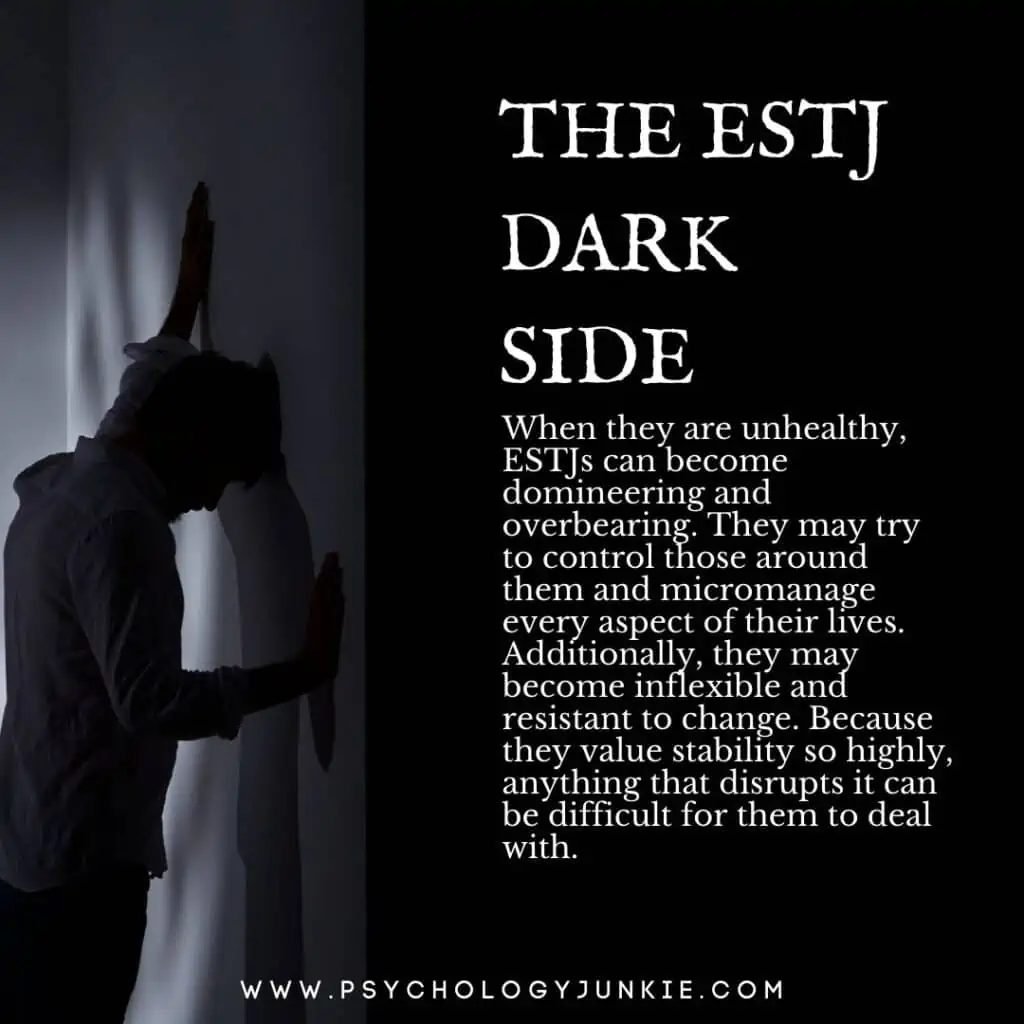

ESTJs are the definition of get-it-done folks. These are the individuals who bear in mind the deadlines, implement the principles, and one way or the other have a backup plan for every thing. If there’s a disaster, an ESTJ already has a guidelines, a plan, and the staff to get it finished.
At their greatest, ESTJs are robust, reliable, and deeply loyal. They’re those you name if you want real-world options, not sugar-coated pep talks. They create significant traditions, preserve communities working, and are sometimes the spine of households, companies, and full organizations. They work laborious, they usually count on everybody else to do the identical—not as a result of they’re controlling (okay, typically they’re controlling), however as a result of they know that stability doesn’t simply occur. Somebody has to ensure the trains run on time, and that “somebody” is often them.
The Darkish Facet: When Management Turns into Micromanagement
ESTJs are pure leaders—however after they’re unhealthy, that management turns into micromanaging every thing in sight.
An unhealthy ESTJ can grow to be controlling, inflexible, and completely unwilling to bend. If issues aren’t finished their method, they’ll redo it correctly (a.ok.a. the way in which it ought to have been finished within the first place). Change? Terrifying. Uncertainty? Unacceptable. As a substitute of adapting, they could double down on guidelines, delegating, and organizing—crushing spontaneity and suppleness below the sheer drive of their will.
At this stage, their relationships can undergo. Whereas they imply properly, they could come throughout as overbearing, important, or emotionally unavailable. Their model of “serving to” would possibly begin feeling extra like “commanding,” and folks round them could begin maintaining their distance simply to keep away from the strain to carry out completely.
The Immature ESTJ: The Workaholic Taskmaster
An undeveloped ESTJ is mainly a boss that by no means clocks out.
They obsess over productiveness, turning each second right into a job to be accomplished. Chill out? What’s that? In the event that they’re not working, they really feel like they’re falling behind. And since they prioritize effectivity, they will grow to be insufferably impatient with anybody who strikes at a slower tempo (which, let’s be actual, is most individuals).
But it surely’s not nearly work—an immature ESTJ can be personally demanding. They could count on everybody to fulfill their impossibly excessive requirements and battle to know why others don’t have the identical degree of drive. If somebody fails to fulfill expectations? Put together for unfiltered disappointment.
The irony? They do need connection. However after they’re caught on this mode, their relationships typically take a backseat to their to-do checklist, leaving them questioning why folks appear distant or offended after they’ve “finished every thing proper.”
When ESTJs Are Confused:
At first, stress simply makes ESTJs double down on their traditional methods. They push tougher, work quicker, and count on everybody else to do the identical. If folks get of their method? Transfer.
But when stress retains piling up? That’s when the grip response kicks in.
A deeply pressured ESTJ flips into their reverse operate—Introverted Feeling (Fi). All of the sudden, the sensible, no-nonsense ESTJ is drowning in emotions—they usually don’t prefer it. They could withdraw, overthink previous errors, and begin taking every thing personally. As a substitute of their traditional confidence, they really feel alone, misunderstood, and emotionally uncooked.
Worst case? They lash out—then instantly remorse it, as a result of shedding management is not one thing an ESTJ enjoys.
Discovering Steadiness:
For an ESTJ to remain grounded, they want a mixture of construction and suppleness. Some key survival methods:
- Self-Care is Not Wasted Time – ESTJs must schedule downtime similar to they schedule work. In the event that they don’t, they’ll run themselves (and everybody round them) into the bottom.
- Relationships Matter (Even When They’re Not Environment friendly) – Not each dialog wants a level. Studying to simply be with folks—with out fixing, advising, or planning—helps them construct deeper connections.
- Listening to Completely different Views is Power, Not Revolt – Publicity to new concepts helps them grow to be extra adaptable and well-rounded.
At their core, ESTJs are beacons of power—the individuals who make issues occur, preserve issues working, and supply stability. After they study to stability their structured nature with a bit of persistence, self-care, and emotional consciousness, they go from being simply efficient to being inspiring leaders who convey out one of the best in everybody.
The ISFJ Darkish Facet
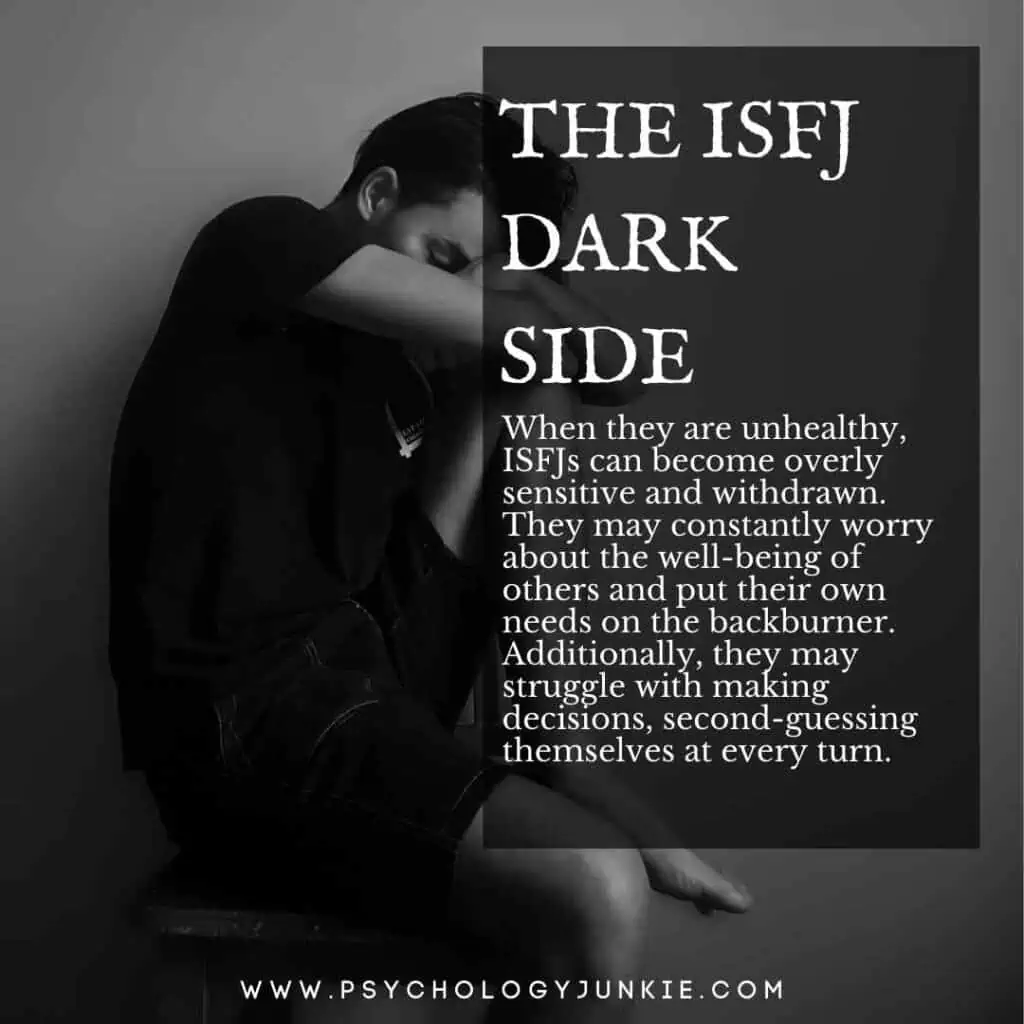

ISFJs are those ensuring your world really capabilities. They preserve monitor of birthdays, bear in mind your espresso order, and one way or the other know if you want a blanket earlier than you even understand you’re chilly. They’re mild and meaning-focused; trying to protect the sweetness and magic within the particulars.
They don’t simply really feel deeply—they act on it. In case you’re sick, they’re the one displaying up with soup. In case you’ve had a dangerous day, they’re checking in with a “simply considered you” textual content. They don’t say they care; they show it.
However right here’s the catch: ISFJs may give an excessive amount of—and after they do, issues begin to go downhill. Quick.
The Darkish Facet: When Serving to Turns into a Sluggish Burn to Resentment
At first, an overworked ISFJ simply retains doing what they all the time do—caring for everybody, ensuring issues run easily, and placing their very own wants on the again burner. However after some time, one thing shifts.
They begin ready for somebody to note how a lot they’re doing. They begin hoping that simply this as soon as, another person will step in and say, “Hey, I received this.” Spoiler: That not often occurs.
So as a substitute of setting boundaries (which might remedy the issue), they bottle it up. They preserve saying “sure” after they wish to say “no,” preserve displaying up after they’d slightly be in mattress, and slowly however absolutely, resentment begins brewing.
At this stage, they could grow to be passive-aggressive—dropping heavy-handed hints about how a lot they do for everybody else whereas pointedly not making eye contact. They could sigh just a bit too loudly, mutter one thing about how nobody ever helps, or develop an uncanny potential to slam cupboards simply laborious sufficient to sound like frustration however not fairly sufficient to be an actual downside.
And if that frustration retains constructing? They withdraw. No dramatic exit, no huge battle—only a quiet retreat into their very own world, secretly hoping somebody will lastly discover they’re lacking.
The Immature ISFJ: The Guilt-Tripping Martyr
An undeveloped ISFJ is a strolling to-do checklist with a grudge.
They wish to be useful, however in addition they need recognition. They need issues finished their method (as a result of their method is clearly the proper method). And in the event that they don’t get appreciation? Oh, they’ll let you already know—simply indirectly.
As a substitute of claiming, “Hey, I’m feeling overwhelmed and will use some assist,” they’ll sigh dramatically and preserve doing every thing themselves, ready for somebody (anybody!) to lastly step up. When that doesn’t occur? Cue resentful silence.
They could additionally grow to be actually rigid. In case you change a plan on the final minute, count on seen discomfort. In case you mess with their fastidiously maintained routine, put together for a very compelled smile. They don’t imply to be inflexible—it simply actually throws them off when issues don’t go as anticipated.
When ISFJs Are Confused: The Doom Spiral Begins
At first, stress makes ISFJs even extra themselves. They attempt to repair it by over-preparing, over-worrying, and over-functioning. They replay previous errors, obsess over attainable disasters, and double-check every thing.
But when stress retains piling up? That’s when issues get bizarre.
A pressured ISFJ flips into their reverse operate—Extraverted Instinct (Ne)—and all of the sudden, as a substitute of their traditional calm, structured considering, their mind goes full conspiracy mode.
- What if every thing I’ve finished is pointless?
- What if everybody secretly hates me?
- What if I get up tomorrow and all of society collapses and I’m the one one left making an attempt to maintain every thing collectively whereas everybody else simply wanders round in chaos?!
They go from sensible and grounded to full-on doom spiral. And the worst half? It feels actual to them within the second. They could even make some weird, out-of-character selections simply to shake up the sensation of being caught.
And afterward? They really feel mortified. Like, “Let’s faux that by no means occurred” mortified.
Discovering Steadiness: How ISFJs Can Cease Operating Themselves Into the Floor
Look, ISFJs want to care for folks. It’s wired into them. However in addition they must study that caring for themselves isn’t egocentric—it’s important. Some key survival methods:
- Boundaries. Boundaries. Boundaries. – Saying “no” isn’t impolite. It’s a survival talent. In the event that they don’t begin defending their time and vitality, they’re going to burn out—and quick.
- Alone Time is Sacred. – ISFJs want quiet, uninterrupted time to recharge. A comfortable studying session? A solo stroll? Journaling? Sure, please.
- Not Every little thing is Their Accountability. – Simply because they can do one thing doesn’t imply they ought to. Letting different folks step up is nice for everybody.
- Making an attempt New Issues (Even when it’s Uncomfortable). – A bit of spontaneity—whether or not it’s a brand new pastime, a visit, or simply switching up their day by day routine—helps preserve them versatile and engaged.
After they’re tapping into their strengths, ISFJs are stabilizers—those who give life a way of tranquility and calm. And after they study to stability their giving nature with a bit of self-care and private progress? That’s after they go from being simply dependable to being unstoppable.
The ISTJ Darkish Facet
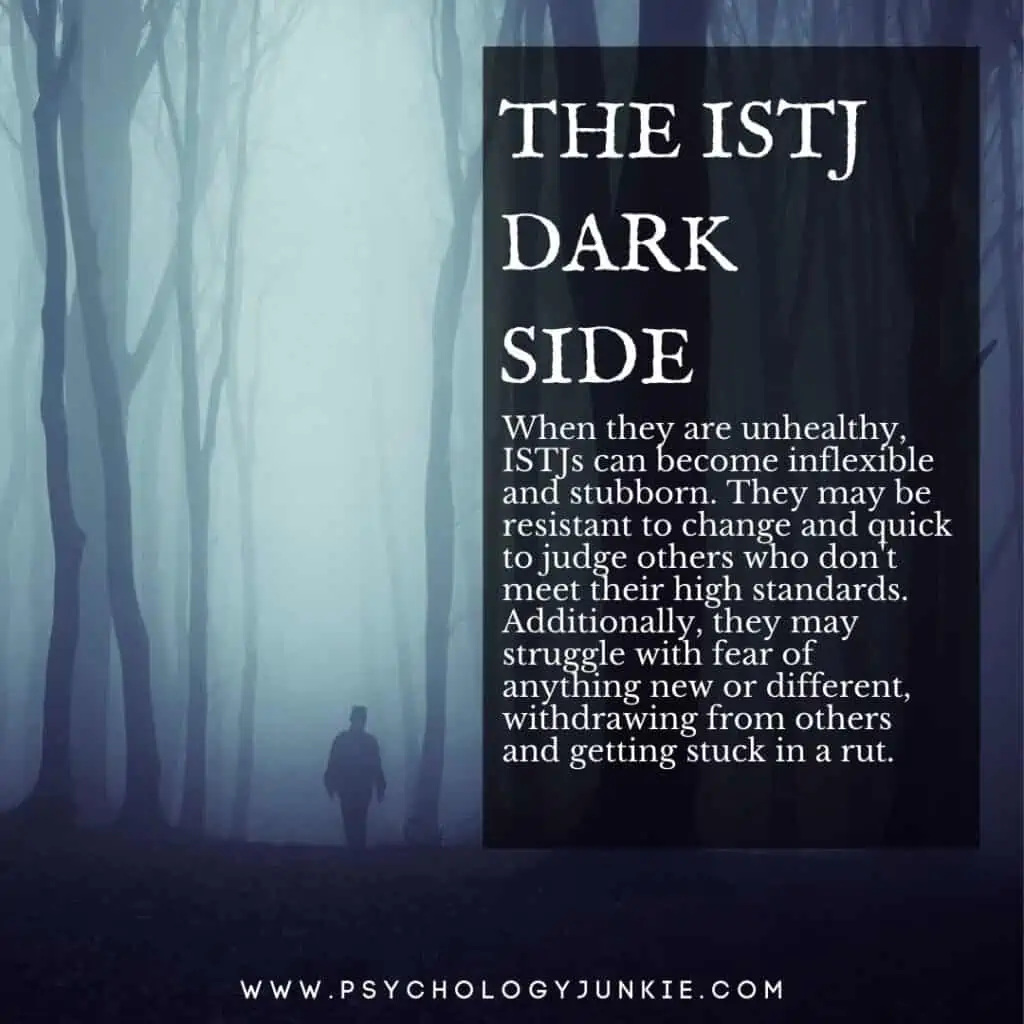

ISTJs are those who pay their payments on time, present up after they say they may, and truly learn the superb print earlier than clicking “agree.” Stability, logic, and consistency? That’s their glad place.
At their greatest, ISTJs are diligent, reliable, and quietly unstoppable. If one thing wants doing, they’ll do it, no fanfare required. They battle for what they imagine in, however they don’t do it in a loud, chaotic way- they do it by creating environment friendly methods, organizing plans, and being attentive to the main points that others miss.
The Darkish Facet: When Construction Turns to Stagnation
ISTJs love the knowledge they’ve gleaned from the previous. However after they lean too laborious into carrying on traditions, they danger turning into rigid.
An unhealthy ISTJ turns into inflexible and controlling, satisfied that their method is the solely method. Change? Unacceptable. Spontaneity? Completely not. If one thing disrupts their fastidiously laid-out plans, count on seen frustration. They won’t say something outright, however the stiff posture and tight-lipped expression says so much all by itself.
In addition they have zero persistence for incompetence. If somebody doesn’t comply with by means of (or worse, ignores fundamental logic), an ISTJ’s inside monologue is mainly: You had one job. They won’t say it—however oh, you’ll really feel it.
And after they actually dig their heels in? Good luck. No drive within the universe is shifting them till they determine it’s time.
The Immature ISTJ: The Strolling Rulebook
An undeveloped ISTJ doesn’t simply comply with the principles—they implement them, whether or not anybody requested them to or not.
They’ll grow to be hypercritical, selecting aside different folks’s selections (Why would you do it that method when there’s clearly a greater method?). They could battle with empathy, assuming feelings are distractions slightly than one thing that, you already know, exist in all human beings.
In addition they hate uncertainty. If there’s no clear plan or previous precedent, an ISTJ would slightly keep away from it than take care of the anomaly. New expertise? Cross. Unfamiliar social scenario? Laborious go. Something that requires them to wing it? Completely not.
The irony? They don’t really dislike studying—they only favor doing it quietly, on their very own phrases, with out somebody forcing them out of their consolation zone.
When ISTJs Are Confused:
Beneath regular circumstances, ISTJs are regular, logical, and measured. However when stress begins creeping in? Issues get tense.
They’ll both:
✅ Snap at folks for no cause (and instantly remorse it).
✅ Obsess over particulars that don’t matter (rewriting an e mail 5 instances as a result of what if there’s a typo?).
✅ Withdraw completely and keep away from folks.
But when stress actually builds up? That’s when issues take an odd flip.
A deeply pressured ISTJ flips into their reverse operate—Extraverted Instinct (Ne)—and all of the sudden begins spiraling into worst-case situations. As a substitute of their traditional grounded considering, their mind turns right into a doomsday generator:
- What if I made a mistake and every thing falls aside?
- What if your entire system is damaged and there’s no method to repair it?
- What if, at this very second, one thing is going on that I’ve no management over and I’m fully unprepared?!
Discovering Steadiness: How ISTJs Can Be Much less Confused and Extra Superior
Look, ISTJs don’t must change who they’re. They simply must regulate their grip on the steering wheel in order that they don’t white-knuckle their method by means of life. Right here’s what helps:
- Construction is Good—However So is Flexibility – Planning is nice. Over-planning to the purpose of psychological gridlock? Not a lot. Studying to adapt (even in small methods) retains them from getting caught.
- Relaxation is Not a Waste of Time – ISTJs want time to unwind, whether or not that’s studying, mountain climbing, or simply sitting in a quiet room the place nobody is making silly choices.
- Connecting With Completely different Individuals Helps – Speaking to quite a lot of folks (particularly ones who suppose in a different way) helps broaden their perspective and retains them from getting caught in a rut.
- New Experiences Gained’t Kill Them (Promise) – They don’t must skydiving-level spontaneity. Just a bit shake-up—making an attempt a brand new pastime, visiting a brand new place—helps preserve their thoughts contemporary.
At their greatest, ISTJs are the muse—those who preserve the world from descending into chaos. However after they loosen up just a bit and study to embrace a smidge of unpredictability? That’s after they go from being simply dependable to being unstoppable.
What Are Your Ideas?
Do you agree with this text? Do you will have another views to share? Tell us within the feedback!
Discover out extra about your persona kind in our eBooks, Discovering You: Unlocking the Energy of Persona Kind, The INFJ – Understanding the Mystic, The INTJ – Understanding the Strategist, and The INFP – Understanding the Dreamer. You may also join with me by way of Fb, Instagram, or Twitter!

